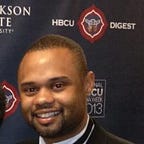Is Miles Becoming the HBCU Homeland Security Capital of the South?
Federal engagement increases visibility of domestic defense as new age major for black colleges.
In the last two months, Miles College has hosted of the nation’s top-ranked officials on homeland security. Last week, the campus welcomed National Security Director James Clapper to discuss the country’s ongoing strategy against Al Qaeda in foreign territories.
In September, CIA Director John Brennan visited the campus as part of a Birmingham tour promoting careers opportunities in intelligence and foreign affairs.
Like many visits of high-ranking federal officials, there is a strategy behind their appearances. Most times, it is to show specific alliances and talking points that are important to a presidential administration to communicate priorities in federal strategy. In this case, it’s a showing that Miles, a small private HBCU in a town which has seen better days in economic growth and industry, has a big role to play in diversifying an industry which increasingly needs minority participation to remain competitive throughout the world.
Foreign affairs is one of the fastest growing sectors of the government working to keep pace in areas of cyberterrorism prevention, border protection and security of domestic infrastructure. And like STEM fields, the United States won’t be able to keep pace with our international peers in China and India without reaching into all corners of the country to find the next generation of genius in thee important industries.
That has to include black and Hispanic people, and it demands direct outreach to HBCUs.
The racial cynic or the conspiracist theorist would take this to mean that HBCUs could be promoting and training the next generation of surveillance force against black communities, or on black people the government would most likely target to be terrorism sympathizers.
You know, on account of how badly we’re screwed here?
But the truth is that this claim could be made against any industry black folks are looking to join. Want to teach? You’re part of the conspiracy to program black minds to accept poor educational and industrial outcomes. Want to be a professional athlete? You’re part of the conspiracy to enhance the ‘magic negro’ theory. Want to be a scientist? You’re part of the conspiracy to wipe black folks out with unbalanced treatment of health maladies.
Want to be an HBCU president? You’re part of the conspiracy to keep bad leadership and poor outcomes in place for institutions in crisis.
Miles and Fairfield, like most of the HBCUs and the cities which surround them, need an industrial niche to command student enrollment, federal and state funding, and regional support to support the reality that southern municipalities are dying. All across the south, HBCU in rural and metropolitan areas are suffering from the fact that there are no industries or amenities keeping young people in certain college towns, and that an aging population mixed with few jobs and no civic expansion is a recipe for a school to gradually meet its demise.
Miles can reverse a lot of that in Fairfield, with homeland security, criminal justice and emergency management programs which can attract the state’s top students and investments in these critical fields. Other schools like Norfolk State University and North Carolina Central University are primed for similar impact, but as state schools, aren’t under the same pressure Miles is to develop the kind of programmatic niche that can create transformational change for the school.
Miles can be an example for private HBCUs in a field set for increased attention and investment from the federal government. Here’s hoping other HBCUs can find similar niches in key areas before the conspiracy theories about shutting black colleges down, become self-fulfilling prophecies.
